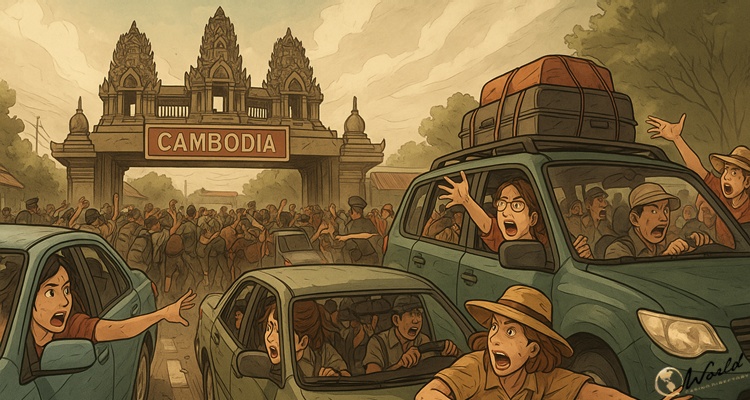Thailand has announced new restrictions targeting casino tourism to Cambodia, implementing tougher border controls and internet service suspensions in an effort to combat transnational cybercrime. The measures come amid heightened tensions following a deadly border skirmish and reflect growing unease over scam operations allegedly linked to Cambodian-based casinos.
According to ABC News, Prime Minister Paetongtarn Shinawatra confirmed on Monday that Thailand would no longer allow tourists traveling with the intention of gambling in Cambodia to cross the border or fly into key destinations like Siem Reap. The crackdown includes added scrutiny for air passengers suspected of visiting casinos and a halt on private vehicles attempting to cross into Cambodia, save for those traveling for essential reasons such as education, medical care, or necessary purchases.
“We will coordinate with international agencies to counter cybercrime in the region,” Shinawatra said, pointing to the UN’s recent designation of Cambodia as a major hub for illicit online operations, including scam centers and unauthorized gambling networks.
Rising Tensions Affect Border Towns and Casino Businesses
Relations between Thailand and Cambodia have rapidly deteriorated since a May 28 clash along a disputed section of their 820-kilometer shared border left a Cambodian soldier dead. The event triggered a series of retaliatory moves between the two nations. Thailand has since restricted cross-border movement and severed internet links to Cambodia’s military and security institutions. Cambodia responded by blocking imports of Thai electricity, fuel, and internet services—actions that may affect local economies on both sides of the border.
Amid these developments, Thailand’s Royal Army issued a directive effective Tuesday at 8am, instructing all Thai nationals employed at Cambodian casinos to remain in Thailand until further notice. Leisure visitors, particularly those traveling for gambling purposes, are also barred from crossing the border.
The fallout has already begun to impact Cambodia’s border gambling industry. Donaco International Ltd, which operates the Star Vegas casino in Poipet, reported a 62% plunge in daily casino traffic and a 42% drop in hotel occupancy since the travel restrictions were introduced. The company warned shareholders that revenue for June would be negatively affected and pledged to provide future updates.
“While the current situation is relatively calm,” Donaco said in a filing, “underlying disputes persist and the Thai government continues to impose measures impacting movements across the border.”
Poipet, a casino hub located just three hours from Bangkok, is heavily reliant on Thai visitors—many of whom make day trips to gamble at one of the eight foreigner-only casinos in the area. The sudden disruption to cross-border travel poses a serious threat to this sector, with ripple effects anticipated across other local services and industries.
Diplomatic Dispute Grows Over Proposed International Mediation
The Cambodian government has turned to international law in hopes of resolving the dispute. On Monday, Prime Minister Hun Manet stated via Facebook that Cambodia had submitted a request for mediation to the International Court of Justice in The Hague. “Cambodia chooses international law and peace,” he wrote.
However, the proposal has been dismissed by Thailand’s Ministry of Foreign Affairs. In an official response, the ministry stated: “A third party may not always be conducive to the preservation of amicable relations among states, particularly in sensitive matters involving complex historical, territorial or political dimensions.”
As both countries hold firm to their positions, tensions over the contested border and the surrounding casino economy show little sign of easing. The situation remains under close watch from regional observers and the international community alike.


